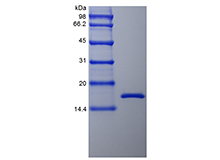Tumor necrosis factor alpha (TNF-α), also called cachectin, is the best-know member of the TNF-family, which can cause cell death. This protein is produced by neutrophils, activated lymphocytes, macrophages, NK cells, LAK cells, astrocytes endothelial cells, smooth muscle cells and some transformed cells. TNF-α occurs as a secreted, soluble form and as a membrane-anchored form, both of which are biologically active. The naturally-occurring form of TNF-α is glycosylated, but non-glycosylated recombinant TNF-α has comparable biological activity. The biologically active native form of TNF-α is reportedly a trimer. Rhesus macaque and human TNF-α show approximately 98 % homology at the amino acid level. Two types of receptors for TNF-α have been described and virtually all cell types studied show the presence of one or both of these receptor types.

